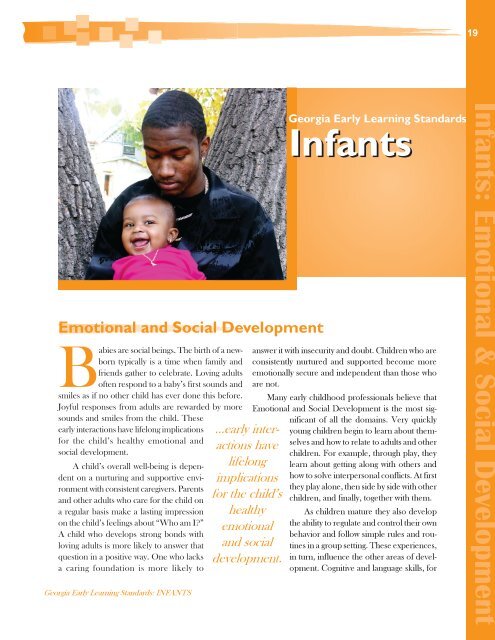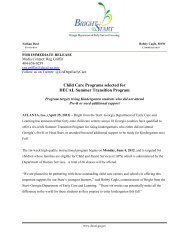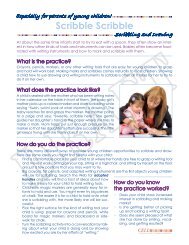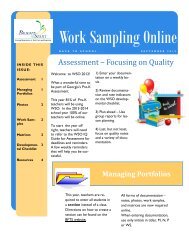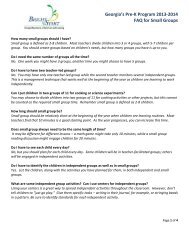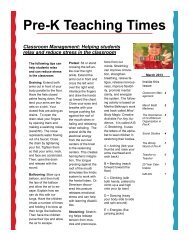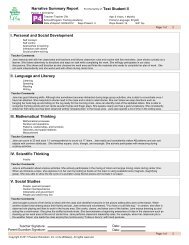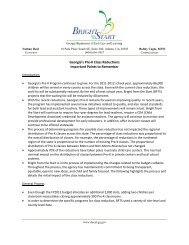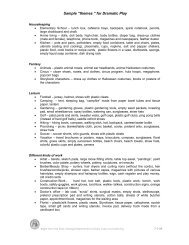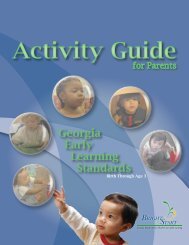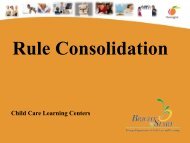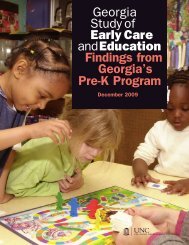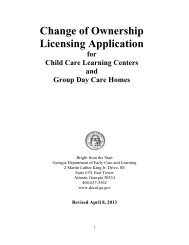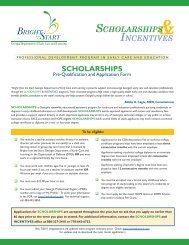Birth Through Age 3 - Bright from the Start
Birth Through Age 3 - Bright from the Start
Birth Through Age 3 - Bright from the Start
Create successful ePaper yourself
Turn your PDF publications into a flip-book with our unique Google optimized e-Paper software.
Emotional and Social Development<br />
Babies are social beings. The birth of a newborn<br />
typically is a time when family and<br />
friends ga<strong>the</strong>r to celebrate. Loving adults<br />
often respond to a baby’s first sounds and<br />
smiles as if no o<strong>the</strong>r child has ever done this before.<br />
Joyful responses <strong>from</strong> adults are rewarded by more<br />
sounds and smiles <strong>from</strong> <strong>the</strong> child. These<br />
early interactions have lifelong implications<br />
for <strong>the</strong> child’s healthy emotional and<br />
social development.<br />
A child’s overall well-being is dependent<br />
on a nurturing and supportive environment<br />
with consistent caregivers. Parents<br />
and o<strong>the</strong>r adults who care for <strong>the</strong> child on<br />
a regular basis make a lasting impression<br />
on <strong>the</strong> child’s feelings about “Who am I?”<br />
A child who develops strong bonds with<br />
loving adults is more likely to answer that<br />
question in a positive way. One who lacks<br />
a caring foundation is more likely to<br />
Georgia Early Learning Standards: INFANTS<br />
...early interactions<br />
have<br />
lifelong<br />
implications<br />
for <strong>the</strong> child’s<br />
healthy<br />
emotional<br />
and social<br />
development.<br />
Georgia Early Learning Standards<br />
Infants<br />
answer it with insecurity and doubt. Children who are<br />
consistently nurtured and supported become more<br />
emotionally secure and independent than those who<br />
are not.<br />
Many early childhood professionals believe that<br />
Emotional and Social Development is <strong>the</strong> most sig-<br />
nificant of all <strong>the</strong> domains. Very quickly<br />
young children begin to learn about <strong>the</strong>mselves<br />
and how to relate to adults and o<strong>the</strong>r<br />
children. For example, through play, <strong>the</strong>y<br />
learn about getting along with o<strong>the</strong>rs and<br />
how to solve interpersonal conflicts. At first<br />
<strong>the</strong>y play alone, <strong>the</strong>n side by side with o<strong>the</strong>r<br />
children, and finally, toge<strong>the</strong>r with <strong>the</strong>m.<br />
As children mature <strong>the</strong>y also develop<br />
<strong>the</strong> ability to regulate and control <strong>the</strong>ir own<br />
behavior and follow simple rules and routines<br />
in a group setting. These experiences,<br />
in turn, influence <strong>the</strong> o<strong>the</strong>r areas of development.<br />
Cognitive and language skills, for<br />
19


